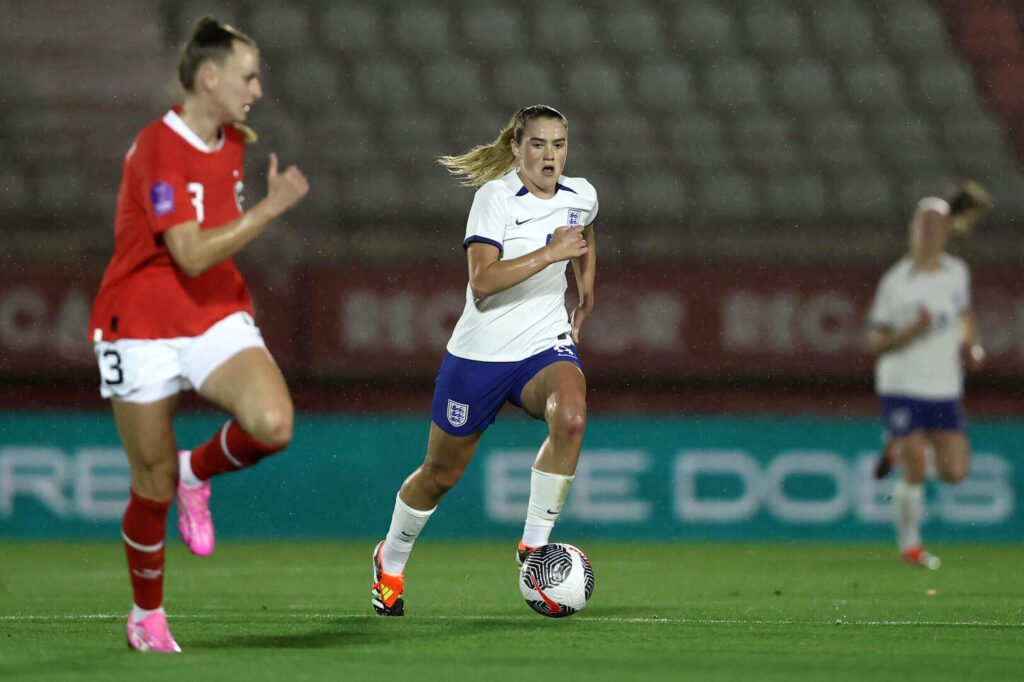This was a game that allowed whatever clouds had gathered around this England team to lift a little.
A comprehensive 7-2 win over Austria emphasised the usefulness of the first of these two friendly fixtures. In another world, a more successful one, England would have been participating in the Women’s Nations League semi-finals with the hope of Olympic qualification.
“We move forward,” said manager Sarina Wiegman after the game. “Of course, it’s a disappointment [to not qualify]. But you have to move on and try to turn that around.”
Wiegman’s time in charge has been dominated by back-to-back tournaments. In her first year, she built up to the European Championship and in her second, the World Cup. Now, with no Olympic Games for Great Britain’s women this summer, she has almost 18 months to evolve her England side ahead of Euro 2025 in Switzerland.
Questions over whether she could rejuvenate a successful team were probably the biggest charge against Wiegman during her time at the Netherlands, along with a reluctance to rotate her starting XI. That meant all eyes were on the line-up against Austria but Wiegman rang the changes.
Grace Clinton (top photo) received a first cap having been an unused substitute throughout two previous camps, and there were starts for fringe players like Hannah Hampton, Maya Le Tissier and Esme Morgan.
Ella Toone hugs Clinton after her England debut (Naomi Baker/The FA via Getty Images)
The idea that Wiegman has never rotated this England side is a bit of a fallacy. There is no doubt she is someone who relies on trusted players, but it is hard to argue with the results. In the past, she has used this February window to experiment with her squads during two editions of the Arnold Clark Cup. The broader reality is that she has had to take a win-now approach to her side given the way the calendar has worked out. There has been very little time to give newer faces the opportunity to step up.
But this camp has been geared towards changing that. With the under-23 squad — something restarted by Wiegman when she joined the Lionesses — also based in Marbella over the break, England have used the opportunity to improve the integration between the two teams. Senior England players were present for the Under-23s’ 3-1 loss to Spain on Thursday and Bristol City defender Naomi Layzell trained with the senior squad earlier in the week. Chelsea’s Aggie Beever-Jones, 20, made the bench for the first time against Austria.
It is clear that Wiegman takes to some players quicker than others, but that does not mean the pathway is not there. Clinton is a clear example of that and she took her starting opportunity with both hands having impressed on loan at Tottenham this season.
It helps that she is a midfielder, an area of the pitch where England have not always been blessed with options. Clinton looked assured in the high-intensity midfield trio with Georgia Stanway and Ella Toone. Her long-range shot after 14 minutes showed she was not lacking in confidence and she was rewarded just four minutes later with a debut goal.
Austria struggled with England’s press. An early mistake from Arsenal goalkeeper Manuela Zinsberger, who palmed Beth Mead’s shot into Alessia Russo’s path, meant that England opened the scoring within three minutes. From there, this England side looked a far cry from the goal-shy team who appeared at the World Cup. Austria, however, were also some distance from the team the Lionesses struggled to break down at Old Trafford in their Euro 2022 opener.
It is not a coincidence that since Mead returned to the side, goals have been easier to come by. It emphasises that, for all it is correct to say that this England team needs to evolve, it is also still waiting for some of its key stars to come back. Whilst Mead now looks well reintegrated, Leah Williamson pulled out with a hamstring injury after being selected for the first time since the anterior cruciate ligament injury (ACL) she sustained in April 2023. Millie Bright is also a long-term absentee.
As the goals flew in, it was a reminder of what England at their very best have been under Wiegman. With five different goalscorers, they showed the kind of relentlessness that made them so watchable in the first year of her management.

Mead’s return has helped England significantly (Naomi Baker/The FA via Getty Images)
There were obvious areas to improve. They conceded two goals from corners, both of which came from unmarked headers. But the overall emphasis was on a performance that ticked every box Wiegman would have wanted — a confident attacking display, an opportunity for younger players, and room to rotate.
The ability to fulfil those aims arises in the spaces where matches are of lesser importance and intensity. International football only gives managers so much time to impart ideas, so it is easy to see why teams like to rely on existing connections. The Women’s Nations League has been successful in raising the competitive nature of an unbalanced continent, but it also pushed teams to grind out results off the back of a summer tournament.
It is no surprise that the England team we saw at the back end of 2023 looked jaded. The opportunity to mix things up can often spark creativity, and sometimes you need a couple of friendly matches to actually do that.
(Top photo: Naomi Baker/The FA via Getty Images)
Read the full article here

